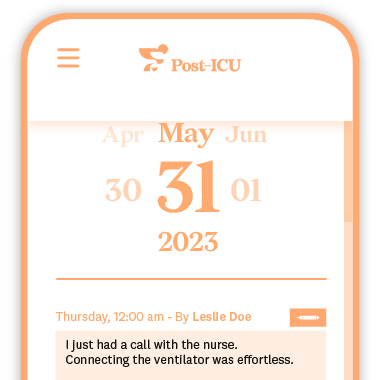Digital tools are reshaping how we care for patients, especially in intensive care units (ICUs). These tools offer ways to bridge the gap between critical illness and post-ICU recovery, improving both patient outcomes and the well-being of their families. During a recent webinar, two experts—Krista Knudson, PhD, MSCR, RN from Marquette University and Leanne Boehm PhD RN ACNS-BC from Vanderbilt University—discussed the transformative power of digital ICU diaries. This innovative intervention not only help patients in processing their experiences but also supports families through challenging times, offering a proactive approach to Post-Intensive Care Syndrome (PICS).
The Importance of ICU Diaries in Post-ICU Care
ICU diaries, originally used in paper form, serve as a powerful tool for both patients and their families. Leanne Boehm emphasized how ICU diaries emerged from a need to address the emotional and psychological struggles many patients face long after their ICU stay. ICU diaries help patients by filling in memory gaps, which are common during and after critical care due to sedation and delirium.
“One of the challenges of PICS that patients have is these delusional memories, or not having memories of what happened to them, and the stress, anxiety, and depression related to those things, and the diaries can help with processing that information,” Leanne explained.
Families also benefit from ICU diaries by feeling involved in the patient’s journey. Krista highlighted that family members often feel helpless when a loved one is critically ill, and the diary gives them a way to actively participate in their care.
“This can be a beautiful gift, where they have a chance to do something that they think will help,” she said.
This involvement supports both the patient and the family, helping them stay connected during the ICU stay and beyond.
Transition to Digital Solutions
As healthcare has moved toward digitalization, ICU diaries have evolved from paper-based journals to more versatile, digital platforms. Leanne Boehm highlighted how digital diaries help reduce some of the common barriers associated with paper diaries. Digital tools guide family members on what to write, making it easier for them to contribute.
“What’s nice about the digital diary that you guys have created is that it does give those prompts” Leanne noted.
She also discussed how digital diaries streamline communication between patients, families, and healthcare teams. The ease of sharing messages and images allows for a richer, more interactive experience.
“With the digital application of the ICU diary, they have the ability to connect, not just by sending texts or phone calls, but they can reach out to other people in their lives… Using the ICU diary digital tool, you can actually have other people in your life make entries or take a picture of the get well card from the grandchild and upload it into the diary.”
The digital platform helps create a more complete record that families can engage with during and after the ICU stay.
Impact on Healthcare Providers
One of the less obvious but equally important benefits of ICU diaries is the positive impact on healthcare providers. Krista shared how these diaries help build better relationships between nurses and families, providing emotional closure for nurses and making their work more meaningful.
“The diaries are a facilitator for communication and connection with family members,” Krista explained, and Leanne added “From the provider perspective, there’s also this understanding… that you can help this patient and their family in a big way with minimal effort.”
Leanne echoed this sentiment, noting that nurses benefit from seeing the positive impact of their care on patients.
“I think the diary fits into that in a great way because the nurses who have access can now stay in touch with those patients as they go to step-down units, check in on them, check in with the family, and I think that goes a long way for them in feeling satisfied,” she said.
By helping healthcare providers connect more deeply with patients and families, the diary becomes an emotional support tool for both staff and patients. The actual impact of ICU diaries on healthcare providers requires more research so we can understand the exact mechanisms and effects.
The F Element of the ABCDEF Bundle and ICU Diaries
The ABCDEF bundle is a framework designed to improve ICU patient outcomes by focusing on aspects like pain management, sedation, and delirium prevention. The “F” in this bundle stands for Family Engagement and Empowerment, which is directly connected to the use of ICU diaries.
Leanne Boehm, who helped develop the bundle, emphasized the importance of family involvement in ICU care. “The ABCDEF bundle is an overarching philosophy toward liberating patients from pain, oversedation, delirium, mechanical ventilation, immobility, and isolation,” she said. Family engagement, represented by the “F,” is crucial in this process.
Family members play a critical role in improving patient outcomes by staying involved in the patient’s care and recovery. ICU diaries facilitate this engagement by giving families a tangible way to contribute during the patient’s stay, whether it’s through documenting the patient’s progress or sharing supportive messages.
“What helped patients was having their family nearby, talking to them, being a part of what’s happening,” Leanne said, referencing research that shows family presence reduces patient distress. By engaging families through tools like ICU diaries, both the patient’s physical and emotional recovery are supported, leading to better outcomes post-ICU.
Integrating Digital ICU Diaries into Clinical Practice
While digital ICU diaries offer clear advantages, Leanne stressed the importance of making these tools user-friendly and accessible.
One of the main challenges is the user experience for both healthcare providers and family members. As Krista noted, many of the barriers arise from the initial setup and use of the diary. “A lot of the barriers tend to be upfront. Hopefully, if we’ve done this well, and we have the education, training, and support, that gets better with time.” She emphasized the importance of appropriate and concise education and training, along with ongoing support for users
Leanne also pointed out that the stress of the ICU environment can exacerbate these barriers. “When you’re already stressed, you don’t need any more barriers… We’re trying to make it as smooth as possible”. This includes ensuring that both the digital tools and the training materials are user-friendly and accessible to staff and families.
Technical issues, such as understanding what to write or navigating the digital platform, are also significant. Krista mentioned, “If there is a digital application, you have tech issues that are involved in the design of the tool. It’s critical to take down all of those barriers to make it as easy to use as possible.”
Successful integration into clinical workflows requires usability testing and training for staff. .“So for instance, with a digital diary, the users are the healthcare providers, the patient, and the family member, and you want to get them to use it or practice it within the frame of mind of how they would be thinking and feeling at that time.” she said. “Continue to do usability testing with nurses while they’re working—how is this working for you now, now that it’s in your workflow, and is it easy to navigate this application and the way it’s laid out now that you’re using it while you’re working.”
Ultimately, successful integration of digital diaries into ICU care depends on ongoing support, usability testing, and clear communication between healthcare teams and families. By addressing these barriers, hospitals can ensure that digital ICU diaries are not only effective but also sustainable in practice.
Final Thoughts
ICU diaries, both paper and digital, are proving to be valuable tools in supporting patients and families through the emotional challenges of critical care. They offer a way to preserve memories, process traumatic experiences, and keep families connected during one of the most stressful times in their lives. Moreover, these diaries serve as a bridge between hospital care and post-discharge recovery, ensuring that the care provided in the ICU extends far beyond the hospital doors.
As digital solutions continue to reshape healthcare, tools like ICU diaries offer a glimpse into how technology can enhance human connection, support mental health, and improve the overall experience for patients, families, and healthcare providers alike.





